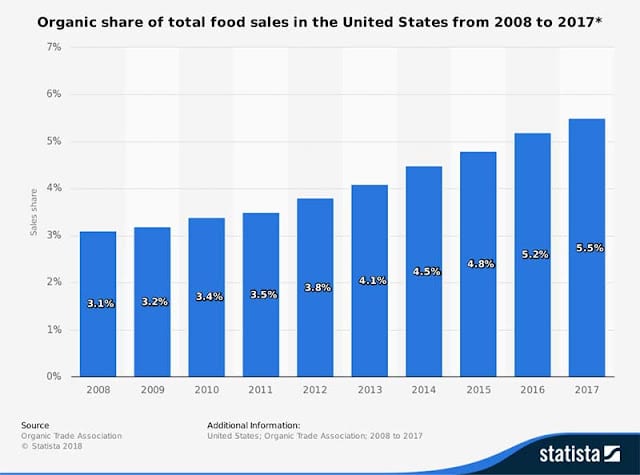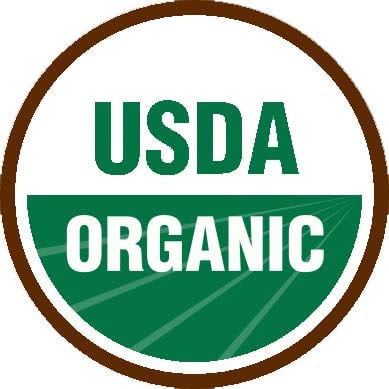Are there any benefits to eating organic fruits and veggies? Definitely. Are these benefits worth the extra cost? One recent study in JAMA suggests the additional costs are worth it if you are trying to lower your cancer risk. I need to track down one of my old neighbors and share this article with him since he once tried to ‘organic veggie shame’ me. Let me explain (here comes a story).

My Neighbor Tried To ‘Organic Veggie Shame’ Me
Several years ago, I was an internal medicine resident living in a 3 story walk-up condo building in Chicago’s Woodlawn neighborhood (on the Southside). A wrought iron fence separated our parking lot from a weed-infested Chicago alleyway and the backyards of the neighboring apartment buildings. I talked one of my neighbors through one of those fences every day. We developed a relationship similar to that of Tim Allen and his neighbor Wilson on the defunct television show Home Improvement.

My neighbor had a level of brilliance that could only come from life experience. No classroom could replicate his life’s lessons from being an ex-black panther, an ex-gang member, an ex-police officer, and ex-backup dancer for the Chi-Lites (a soul group from the 70s). As odd as his background was, it all made sense when you spoke with him. At face value, he seemed like a savant without all of the fancy degrees. He somehow comfortably occupied the space between being a genius and a florid conspiracy theorist. Often, I couldn’t tell if he was the most interesting man south of 63rd street or an unabashed liar.
 |
| The Chi-Lites: notice the lack of back up dancers |
Nonetheless, I sincerely appreciated our conversations. Thus, I was slightly taken aback when he called me a ‘gentrifying hipster’ after seeing my bags from Whole Foods. Initially, I thought he tried to shame me for carrying a pink grocery tote while wearing skinny jeans. Thankfully, that wasn’t the case due to evolving perceptions of masculinity (plus I really liked my tote). Unfortunately, he did try to shame me for buying organic fruits and veggies.
This post is dedicated to the organic veggie-shamers. Here, I will break down a recent study that associates organic vegetable consumption with lower cancer risk.
First, What Is An ‘Organic Food’?
Surprisingly, I never had a class in medical school that mentioned ‘organic food.’ Concepts related to farming and food processing aren’t a priority for most medical schools. Nonetheless, people should know what constitutes organic food since organic products account for an estimated 5.5% of food sales in the U.S.
 |
| Only 5.5% of food sales in were from organic food in 2017 |
The United States Department of Agriculture (USDA) defines organic foods as:
- [Foods] produced without excluded methods (e.g., genetic engineering), ionizing radiation, or sewage sludge.
- [Foods] produced per the National List of Allowed and Prohibited Substances (National List).
- [Foods] overseen by a USDA National Organic Program- authorized certifying agent, following all USDA organic regulations.
The prohibited substances list includes synthetic chemicals such as most synthetic pesticides. Check out the full list of allowed and prohibited substances here.
Once a product meets these criteria, the USDA can label it with one of four categories:
1. 100 Percent Organic
Only products that contain 100% organic ingredients. Look for the USDA organic seal or the 100% organic claim to identify these products.
2. Organic
Any food that has a minimum of 95% organic ingredients. Again look for the USDA organic seal, but not the 100% organic claim.
3. Made With Organic [INSERT INGREDIENT]
These are products that include at least 70% organically produced ingredients. You won’t find the organic seal on these products. These products may say “made with organic [up to three ingredients].
4. Specific Ingredient Listings
These are products that contain less than 70 percent organic ingredients. The label only identifies which ingredient is organic. Here’s an example: “Ingredients: water, barley, beans, organic tomatoes, salt.”
OK, Can Eating Organic Vegetables Lower Your Risk Of Cancer? Maybe…But It’s Complicated
First and foremost, I wouldn’t bet on organic veggies doing much if you smoke cigarettes non-stop, eat grilled meat for every meal, and never exercise. The organic vegetables should be a part of a healthy lifestyle overall. Similarly, eating organic fruits and veggies doesn’t take the place of age-appropriate cancer screening. Depending on your age and family history, get your colonoscopies, pap smears, prostate checks, et cetera.
The JAMA Study: Findings From The Nutrinet-Sante Cohort
That said, there was a recent study in the Journal of the American Medical Association (JAMA) that sought to examine the association between “an organic food-based diet (i.e., a diet less likely to contain pesticide residues) and cancer risk.” A growing body of evidence linking pesticides with cancer development was the premise behind the study.
The study, led by Dr. Julia Baudry, included a cohort of 68,946 French adults. The study’s participants reported their frequency of consuming organic foods from 2009 to 2016. The volunteers in the study were categorized into 4 different groups based on their organic food consumption. The participants also reported any cancers they developed over the 5 year study period. The researchers used statistical methods to estimate the association between cancer risk and eating organic products.
The researchers demonstrated that women, people who exercise, high-income earners, and people with education beyond college had higher likelihoods of consuming organic foods.
Lower Cancer Risk Associated With Increased Consumption Of Organic Foods
During the study period, the participants developed 1340 cancers. Breast and prostate cancers were the most common (check out my post on diet and prostate cancer). The researchers found that the highest consumers of organic foods had a 25% lower risk of developing cancer compared to the lowest consumers of organic foods.
Oddly, the decreased risk of cancer with eating organic foods wasn’t associated with all cancers. In fact, the study associated a higher risk of developing lymphoma with increased consumption of organic veggies.
Was This A Perfect Study? Not Quite. Here Are A Few Of The Study’s Strengths And Weakness
Strengths
- A large sample size (a study with one person isn’t very helpful).
- A prospective design; they followed people over time.
Weaknesses
The biggest weakness of the study is that the study’s questionnaire for organic food consumption was not validated. Further, it relied on self-reporting. These issues are common in most nutrition studies. They are also reasons why you should interpret the results with caution.
Always keep in mind that associations and causation are not the same. The study doesn’t prove that conventional foods cause cancer.
What’s The Bottom Line?
There’s a need for more research focusing on how eating organic foods impact the risk of developing cancer. This study was a step in the right direction, but it had some limitations.
For me personally, I’ve always tried to limit my exposure and my family’s exposure to pesticides. This study doesn’t clearly confirm I’m doing the right thing, but it suggests I’m on the right track.
Despite my neighbor trying to shame me, I will continue buying organic foods, especially foods from the environmental working group’s Dirty Dozen list.
Important Notice: This article originally appeared in www.thedocskitchen.com, authored by Dr. Ed McDonald where all credits are due.











